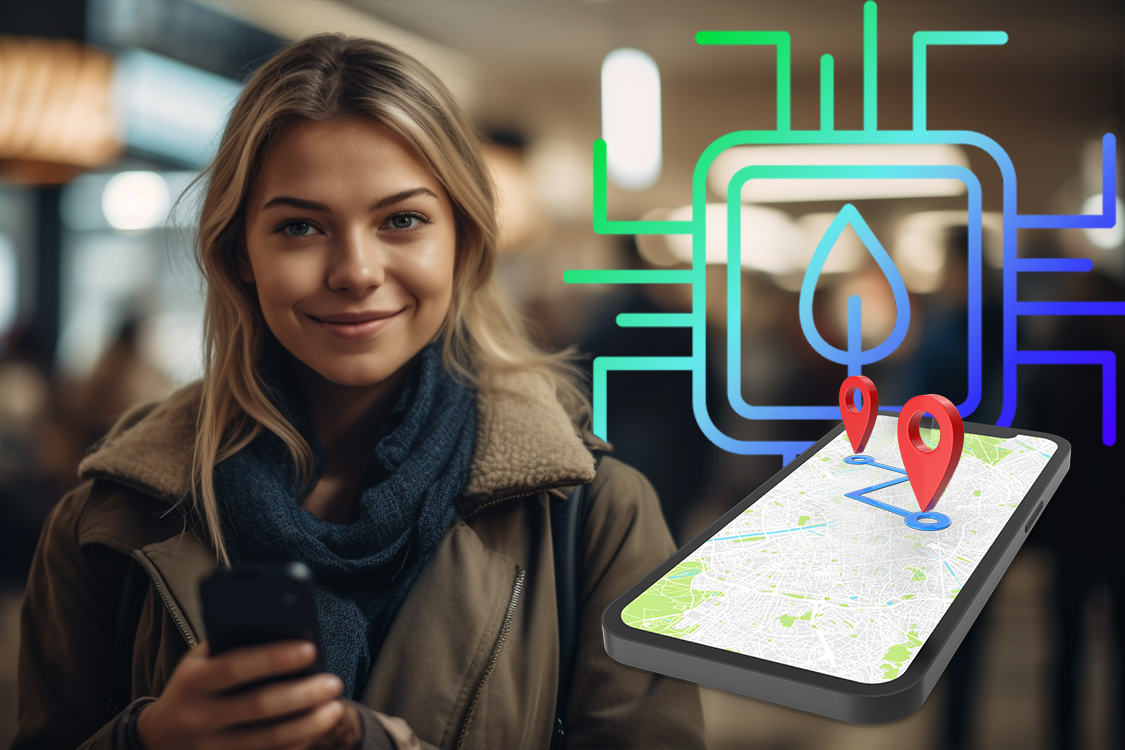Technology Trends

The word “sustainability” has been tossed around a lot lately, but it’s not just a buzzword anymore. Scientists have definitive evidence the earth is suffering from extremes in weather which has an effect on people’s livelihoods, the supply chain and business operations. The technological world in which we live might be able to offer some solutions via location intelligence help sustainability.
Key Ways Location Intelligence Aids Sustainability
Location intelligence for sustainability uses real-time geographic and behavioural data to guide smarter environmental decisions. Here are some key ways it supports long-term ecological goals:
- Energy Efficiency in Buildings – Location intelligence can analyse foot traffic, occupancy patterns and energy usage to optimize lighting, heating and cooling systems—reducing waste.
- Transportation Optimization – By tracking visitor and commuter flow, businesses and cities can design greener transit routes, lowering carbon emissions.
- Sustainable Urban Planning – Data-driven insights help governments identify ideal areas for green spaces, renewable energy installations and low-impact infrastructure.
- Resource Management – Location intelligence-based sustainability tools monitor water usage, waste disposal and supply chain movements to reduce environmental footprints.
- Climate Risk Analysis – Predictive analytics identify areas vulnerable to flooding, heatwaves or pollution, supporting proactive sustainability initiatives.
Real-World Examples of Location Intelligence for Sustainability
- Retail: Store chains use location intelligence technology to map high-energy consumption zones and schedule eco-friendly maintenance.
- Smart Cities: Municipalities deploy location intelligence solutions to track air quality and implement green mobility plans.
- Corporate Campuses: Companies apply location intelligence services to monitor employee movement and optimise energy use across offices.
These examples prove that location intelligence-based sustainability initiatives are not just theory—they drive measurable environmental impact while saving costs.


What is Location Intelligence?
Location intelligence is the process of analyzing and utilizing geographical and spatial data to gain insights and make informed decisions. It uses various technologies to collect and analyze data on the physical location and characteristics of people, places and things.
A wide range of industries and applications use location intelligence, including retail, logistics, transportation, real estate, urban planning and public safety. By analyzing location data, businesses and organizations can gain insights into customers’ behaviour, market trends and operational efficiency, which can impact business strategy and decision-making.
Some examples of location intelligence applications include analyzing foot traffic in a retail store, optimizing delivery routes for a logistics company, identifying potential real estate development opportunities, and predicting the spread of a disease outbreak.
A Tipping Point for the World
In a 2022 sustainability report, Deloitte polled more than 2,000 C-suite executives in 21 countries to gauge their concerns about sustainability and climate change.
The poll showed that almost 79% of executives see the world at a tipping point for responding to climate change compared to just 59% eight months prior, stating: “Despite the gravity of the moment, there is a prevailing sense of optimism as 88% (compared to 63% eight months prior) agree that with immediate action, we can limit the worst impacts of climate change.”
Businesses at every level – from those already established for many years to startups – are employing location intelligence to pave the way for sustainability strategies.
How the Location Intelligence Market can Help
By providing insights and solutions to address environmental and social challenges, location intelligence can play a huge part. Let’s have a look at the following ways this technology can help to promote sustainability:
- Mitigating climate change. Organizations can develop and implement strategies to lessen the impact of climate change using location intelligence. For instance, this technology can help to identify areas at risk for flooding, drought, or other weather extremes and help to make decisions on the location of renewable energy infrastructure.
- Managing resources. With location intelligence, organizations can optimize their resource management such as water usage, energy consumption, and managing waste. Location intelligence that Mapsted’s can provide real-time data on resource uses which helps to identify areas for improvement.
- Sustaining transportation. Optimized transportation systems can reduce emissions and promote sustainable transportation. For example, location intelligence can help by identifying the most efficient transportation routes, promoting public transportation, and encouraging the use of electric vehicles.
- Green infrastructure. Identify opportunities for green infrastructure, such as renewable energy, green roofs, and rain gardens, to reduce their environmental impact. For instance, a real estate developer could use location intelligence to identify the most suitable sites for solar panel installations.
- Energy efficiency. Optimize energy usage by analyzing data on energy consumption, identifying areas for improvement, and monitoring progress over time. For example, a retail chain could use location intelligence to identify stores with high energy usage and implement measures to reduce energy consumption.
Building Sustainability
Using algorithms and data-driven maps can show environmental restrictions, available land, and climate, among other variables to give organizations and agencies precise options before even physically seeing sites. Precision is baked into location intelligence. This precision can be important for anchoring operations with a data-driven approach to see the probable impacts of actions and to address issues, mostly in real-time.
Digitizing business operations is essential so each step can be monitored and analyzed. For example, intelligent technology today even makes it possible for farmers to get smartphone alerts on crops that have been planted or even data regarding expected profit per field.
Wrap Up
Sustainability needs precision and partners who understand the concept of location-based technology. Mapsted is a leader in the location intelligence market, constantly innovating and improving every interaction within indoor and outdoor spaces. Join Mapsted’s roster of clients around the world and receive insights on how location-based technology can assist your business in becoming more sustainable.
For additional information, we recommend this video on How to Unlock the Potential of Location Technology with Mapsted, and our blog covering What Is Location Intelligence and How Can It Be Used in Business?
Frequently Asked Questions
Q1. What is location intelligence?
Ans. Digital trust refers to the level of confidence that individuals and businesses have in the security, privacy, and reliability of digital transactions and interactions. It is important for businesses because it helps to build customer loyalty and drive revenue growth.
Q2. What are some features of digital trust?
Ans. Digital trust is built on several key features, including transparency, security, reliability, privacy, and accountability. These features help to establish trust between businesses and their customers and ensure that digital transactions are conducted safely and securely.
Q3. How can businesses build digital trust?
Ans. Businesses can build digital trust by implementing strong security and privacy measures, being transparent about their data practices, providing reliable and consistent services, and being accountable for their actions. This can be done through clear and concise communication with customers, regular testing and auditing of systems, and adhering to industry standards and best practices.
Q4. How does digital trust work?
Ans. Digital trust involves creating a secure and dependable digital space for transactions and interactions. It includes strong security measures, data protection, reliable services, and accountability. Building trust leads to long-term relationships, increased revenue, and growth.
Q5. What are the pillars of digital trust?
Ans. The pillars of digital trust are security, privacy, reliability, transparency, and accountability. These pillars help businesses establish trust with customers and conduct safe transactions, leading to customer loyalty and revenue growth.
Q6. How do you apply intelligence in your locality?
Ans. By integrating location intelligence analytics with local infrastructure, cities and businesses can identify problem areas (like traffic congestion or high energy use) and implement sustainable solutions.
Q7. How does environmental intelligence contribute to sustainable development?
Ans. Environmental intelligence provides real-time data about weather, pollution and land use, helping planners and businesses take proactive steps to reduce environmental risks and promote long-term ecological balance.
Q8. How can artificial intelligence impact sustainability?
Ans. AI combined with location intelligence data enhances predictions for energy demand, improves supply chain efficiency and supports climate-friendly initiatives such as smart grids and renewable energy optimization.
